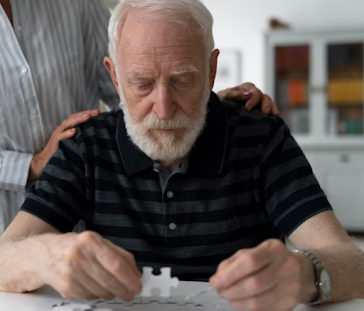How Pranic Healing Techniques May Benefit Alzheimer's Individuals?
In the labyrinth of alternative healing methods, one practice has been gaining attention for its potential to provide relief to individuals facing the challenges of Alzheimer's disease. Pranic healing, rooted in ancient traditions and focused on harnessing the body's vital energy, offers a unique approach to supporting those dealing with this neurodegenerative condition. While modern medicine remains essential, the holistic techniques of healing have piqued interest as a complementary strategy. In this brief exploration, we'll delve into how divine healing techniques might offer benefits to individuals grappling with Alzheimer's, providing a glimmer of hope amidst the complexities of cognitive decline.
Understanding Pranic Healing
Pranic healing is an energy-based healing practice rooted in the belief that the body has an innate ability to heal itself. This holistic approach originates from ancient Eastern traditions and is grounded in the idea that the human body is not just composed of physical matter but also vital energy, or "prana." Practitioners of pranic healing work with this subtle life force to balance and harmonize the energy centers, or "chakras," within the body. By clearing blockages and ensuring a smooth flow of prana, pranic healers aim to restore physical, emotional, and mental health.
Alzheimer's and the Energetic Perspective
Alzheimer's disease takes a toll not only on the affected individual's cognitive abilities but also on their overall well-being. The gradual deterioration of memory and cognitive function often leads to emotional distress, anxiety, and a diminished sense of self. From an energy-healing perspective, these symptoms can be seen as disruptions in the energy flow within the body. By addressing the energetic imbalances, pranic prana techniques may offer a unique way to alleviate some of these challenges.
(1) Enhanced Cognitive Function
While energy healing is not a direct cure for Alzheimer's disease, some proponents suggest that it may aid in maintaining cognitive function. The practice's proponents believe that by optimizing the flow of prana throughout the body, cognitive abilities could potentially be enhanced. It's important to note that scientific evidence in this area is limited, and more research is needed to establish a concrete link between healing and cognitive improvement.
(2) Supporting Caregiver Well-being
Alzheimer's doesn't just affect the patients; it takes an emotional and psychological toll on caregivers as well. Caregivers often report feelings of stress, fatigue, and burnout. Pranic healing sessions can be beneficial for caregivers, helping them manage their own energy levels, reduce stress, and maintain emotional equilibrium. By focusing on self-care, caregivers can better support their loved ones in their journey.
(3) Reduce Stress and Emotional Balance
Alzheimer's patients often experience heightened levels of stress and emotional turmoil. Divine healing techniques, which involve gentle touch or even hands-free manipulation of energy, can help reduce stress and induce relaxation. By targeting specific energy centers associated with emotions, practitioners aim to create a harmonizing effect on emotional well-being. A study published in the "Journal of Holistic Nursing" found that energy healing techniques, including healing, were effective in reducing anxiety and improving emotional balance in elderly individuals.
(4) Promoting Relaxation and Sleep
Sleep disturbances are common among Alzheimer's patients, exacerbating the challenges they face. Energy healing's relaxation-inducing techniques could potentially contribute to improved sleep quality. By channeling prana to balance energy centers associated with restfulness, practitioners aim to promote a more tranquil state of mind conducive to better sleep.
(5) Complementing Traditional Treatment
It's important to emphasize that prana healing should not replace traditional medical approaches for Alzheimer's disease. Instead, it can be seen as a complementary practice that may enhance the overall well-being of individuals living with the condition. When used alongside medical treatments, healing might contribute to a more holistic approach to managing Alzheimer's symptoms.
(6) Providing a Sense of Connection
Alzheimer's patients often struggle with feelings of isolation and disconnection from their surroundings. The compassionate and gentle nature of divine healing sessions could potentially provide a sense of human connection and touch, which might be comforting to those battling cognitive decline.
Conclusion
While pranic healing techniques offer promising avenues for supporting individuals with Alzheimer's, it's crucial to approach them as complementary strategies that work in harmony with traditional medical care. The intricate dance between science and spirituality, between modern medicine and ancient wisdom, unveils a tapestry of potential benefits for those navigating the challenges of Alzheimer's. As research and understanding evolve, individuals and caregivers have the opportunity to explore these approaches with open hearts and a holistic perspective, seeking not only physical relief but also solace for the mind and spirit in the face of this intricate condition.
Read Also: Rebuilding with Energy: Pranic Healing's Role in Bone Recovery
Curious Minds Want to Know
(1) How does pranic healing promote connection for Alzheimer's individuals?
Pranic Healing promotes connection for Alzheimer's individuals by using energy techniques to reduce anxiety and agitation, creating a calmer and more receptive environment for communication and engagement.
(2) Can Pranic Healing completely cure Alzheimer's disease?
Pranic Healing is not recognized as a complete cure for Alzheimer's disease; it is a complementary approach that focuses on energy balance and relaxation but should not replace medical treatment.

.jpeg)
.png)

Comments
Post a Comment